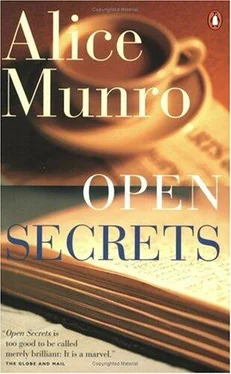In the shanty Annie washed him off and we sat still a while not knowing what we should do. The preacher was at the inn as there was no church or house for him yet and the inn was only about four miles away, but the storm had come up very fierce so you could not even see the trees at the edge of the clearing. It had the look of a storm that would last two or three days, the wind being from the northwest. We knew we could not keep the body in the shanty and we could not set it out in the snow fearing the bobcats would get at it, so we had to set to work and bury him. The ground was not frozen under the snow, so I dug out a grave near the shanty and Annie sewed him in a sheet and we laid him in his grave, not staying long in the wind but saying the Lord’s Prayer and reading one Psalm out of the Bible. I am not sure which one but I remember it was near the end of the Book of Psalms and it was very short.
This was the third day of April, 1852.
That was our last snow of the year, and later the minister came and said the service and I put up a wooden marker. Later on we got our plot in the cemetery and put his stone there, but he is not under it as it is a foolish useless thing in my opinion to cart a man’s bones from one place to another when it is only bones and his soul has gone on to Judgment.
I was left to chop and clear by myself and soon I began to work side by side with the Treeces, who treated me with the greatest kindness. We worked all together on my land or their land, not minding if it was the one or the other. I started to take my meals and even to sleep at their place and got to know their daughter Jenny who was about of my age, and we made our plans to marry, which we did in due course. Our life together was a long one with many hardships but we were fortunate in the end and raised eight children. I have seen my sons take over my wife’s father’s land as well as my own since my two brothers-in-law went away and did well for themselves in the West.
My brother’s wife did not continue in this place but went her own way to Walley.
Now there are gravel roads running north, south, east, and west and a railway not a half mile from my farm. Except for woodlots, the bush is a thing of the past and I often think of the trees I have cut down and if I had them to cut down today I would be a wealthy man.
The Reverend Walter McBain, Minister of the Free Presbyterian Church of North Huron, to Mr. James Mullen, Clerk of the Peace, Walley, United Counties of Huron and Bruce, September 10, 1852.
I write to inform you, sir, of the probable arrival in your town of a young woman of this district, by the name of Annie Herron, a widow and one of my congregation. This young person has left her home here in the vicinity of Carstairs in Holloway Township, I believe she intends to walk to Walley. She may appear at the Gaol there seeking to be admitted, so I think it my duty to tell you who and what she is and her history here since I have known her.
I came to this area in November of last year, being the first minister of any kind to venture. My parish is as yet mostly bush, and there is nowhere for me to lodge but at the Carstairs Inn. I was born in the west of Scotland and came to this country under the auspices of the Glasgow Mission. After applying to know God’s will, I was directed by Him to go to preach wherever was most need of a minister. I tell you this so you may know what sort I am that bring you my account and my view of the affairs of this woman.
She came into the country late last winter as the bride of the young man Simon Herron. He had written on my advice to the House of Industry in Toronto that they might recommend to him a Christian, preferably Presbyterian, female suitable to his needs, and she was the one recommended. He married her straightaway and brought her here to the shanty he had built with his brother. These two young lads had come into the country to clear themselves a piece of land and get possession of it, being themselves orphans and without expectations. They were about this work one day at the end of winter when an accident befell. A branch was loosed while chopping down a tree and fell upon the elder brother so as to cause instant death. The younger lad succeeded in getting the body back to the shanty and since they were held prisoner by a heavy snowstorm they conducted their own funeral and burial.
The Lord is strict in his mercies and we are bound to receive his blows as signs of his care and goodness for so they will prove to be.
Deprived of his brother’s help, the lad found a place in a neighbouring family, also members in good standing of my congregation, who have accepted him as a son, though he still works for title to his own land. This family would have taken in the young widow as well, but she would have nothing to do with their offer and seemed to develop an aversion to everyone who would help her. Particularly she seemed so towards her brother-in-law, who said that he had never had the least quarrel with her, and towards myself. When I talked to her, she would not give any answer or sign that her soul was coming into submission. It is a fault of mine that I am not well-equipped to talk to women. I have not the ease to win their trust. Their stubbornness is of another kind than a man’s.
I meant only to say that I did not have any good effect on her. She stopped appearing at services, and the deterioration of her property showed the state of her mind and spirit. She would not plant peas and potatoes though they were given to her to grow among the stumps. She did not chop down the wild vines around her door. Most often she did not light a fire so she could have oat-cake or porridge. Her brother-in-law being removed, there was no order imposed on her days. When I visited her the door was open and it was evident that animals came and went in her house. If she was there she hid herself, to mock me. Those who caught sight of her said that her clothing was filthy and torn from scrambling about in the bushes, and she was scratched by thorns and bitten by the mosquito insects and let her hair go uncombed or plaited. I believe she lived on salt fish and bannock that the neighbours or her brother-in-law left for her.
Then while I was still puzzling how I might find a way to protect her body through the winter and deal with the more important danger to her soul, there comes word she is gone. She left the door open and went away without cloak or bonnet and wrote on the shanty floor with a burnt stick the two words: “Walley, Gaol.” I take this to mean she intends to go there and turn herself in. Her brother-in-law thinks it would be no use for him to go after her because of her unfriendly attitude to himself, and I cannot set out because of a deathbed I am attending. I ask you therefore to let me know if she has arrived and in what state and how you will deal with her. I consider her still as a soul in my charge, and I will try to visit her before winter if you keep her there. She is a child of the Free Church and the Covenant and as such she is entitled to a minister of her own faith and you must not think it sufficient that some priest of the Church of England or Baptist or Methodist be sent to her.
In case she should not come to the Gaol but wander in the streets, I ought to tell you that she is dark-haired and tall, meagre in body, not comely but not ill-favoured except having one eye that goes to the side.
Mr. James Mullen, Clerk of the Peace, Walley, to the Reverend Walter McBain, Carstairs, North Huron, September 30, 1852.
Your letter to me arrived most timely and appreciated, concerning the young woman Annie Herron. She completed her journey to Walley unharmed and with no serious damage though she was weak and hungry when she presented herself at the Gaol. On its being inquired what she did there, she said that she came to confess to a murder, and to be locked up. There was consultation round and about, I was sent for, and it being near to midnight, I agreed that she should spend the night in a cell. The next day I visited her and got all particulars I could.
Читать дальше













